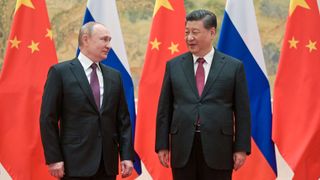Russia has amassed around 130,000 troops on the Ukrainian border while China is coercing a growing number of countries. Their apparent confidence is taken as evidence that authoritarian states are ascendant while democracies are increasingly seen as weak, confused and in disarray. In truth, Russia and China have a far more precarious road ahead than the democratic polities they detest.
Let’s begin with the popular idea that a Russian or Chinese state ruled by one man with an iron fist means these countries are better at statecraft than democratic rivals. It is seductive reasoning. Democratically elected leaders have limited time in power, must balance different and competing interests, and cannot pursue objectives in a single-minded manner. In contrast, dictators can focus on using more elements of national power to achieve permanent ends.
The actual situation is much more awkward and intractable for Vladimir Putin and Xi Jinping. They seem to have become allies in their stand against the world’s liberal democracies. Both have identified themselves as the embodiment of Russian and Chinese nationalism respectively and, in the process, conflate threats to their personal power as a danger to their countries. In this sense, they are on a similar path.
Look at the enduring problems they have created with this mindset; for example, their intolerance for the existence of stable, functional and prospering democracies around them. They fear these democracies will inspire dissent and cause them to be accountable for their own shortcomings.
Moscow’s moves have revived anti-Russian nationalism in a country of almost 45 million people with the second-largest land mass in Europe. If Russia invades, Finland and Sweden may well join NATO and the collective security organisation will gain a renewed and increased sense of purpose.
Russia is forced to use stretched resources to prop up corrupt and oppressive regimes in Kazakhstan and Belarus. China cannot allow liberal institutions in a thriving Hong Kong or accept cultural self-determination in Xinjiang and Tibet. As a result, Beijing spends more on internal security than on the People’s Liberation Army, the lion’s share of resources going towards suppressing these two restive regions.
Now consider the strategic implications of events regarding Ukraine and Taiwan. Moscow’s moves have revived anti-Russian nationalism in a country of almost 45 million people with the second-largest land mass in Europe. If Russia invades, Finland and Sweden may well join NATO and the collective security organisation will gain a renewed and increased sense of purpose.
In Asia, Beijing’s belligerence means the goal of peaceful Taiwanese unification is further away than ever and a broad militarised front is coalescing around and against China. If Beijing were to use force against Taiwan, the benign environment China needs to continue its rise evaporates with existential dangers for Xi and the Communist Party.
Perhaps these countries and their leaders are not as good at statecraft as many believe, but their capacity to disrupt and intimidate is undeniable. This is where the advanced democracies must wear significant blame. To maintain their personal hold on power, Putin and Xi need to continually point to evidence of success against the democracies they mock and demonise. It is not in our interest to make them look like strategic geniuses or normalise their coercive behaviour.
Russia was let off far too lightly after it invaded Georgia in 2008. Europe, and Germany most of all, became unnecessarily dependent on Russian gas even though Putin’s intentions have been clear for almost two decades. Western Europe’s refusal to take more responsibility for its own defence has emboldened Putin and made the former more vulnerable to coercion and too reliant on de-escalation rather than deterrence.
China is a more complex problem but one partly of our own making. Even before Xi, Chinese leaders were allowed an easy ride. China is given substantial access to advanced markets while the most important parts of its economy are off limits to the world. Massive state-sponsored theft of technology and know-how is still tolerated. Until recently, there was little appetite to respond to growing Chinese aggression in disputed maritime regions. Feckless or shortsighted actions by democratic nations have helped convince China there is little downside to behaving this way. And it has led to the false but self-defeating assessment that Xi is fundamentally undeterrable.
Look more carefully beneath the surface and it will become evident our political systems, economies and societies are more resilient and adaptable than Russian or Chinese alternatives.
On any issue, any leader can be made to change their calculations. It is about acquiring the capability and demonstrating enough resolve to compel Russia and China to consider the costs and risks of assertive action. These countries relentlessly assess relative strengths and know the advanced democracies still enjoy huge advantages, notwithstanding their sneering rhetoric against us. From key technologies and innovations to finance and markets, the power is still with the US and its allies. In East Asia, there is much to do militarily in terms of doctrine, development, and deployment – with not much time to do it. But we are heading in the right direction. We have agency to determine the outcome and it is far from a lost cause.
There is still the need for a permanent change in psychology. It is a fact many non-democracies can be our friends and partners, but our most serious rivals are autocratic. It is important to see Russia and China as they see us. Co-operation is sometimes possible but democracies must accept they are already engaged in a comprehensive material and normative competition. This means always identifying and using leverage, imposing costs and a willingness to absorb harmful measures against us. Deterrence will otherwise fail.
We can end on an optimistic note even if these are difficult and dangerous days and we still have a self-generated crisis of confidence. Democracies tend to focus too much on their flaws and not enough on their strengths while autocracies seek to survive by doing the opposite. Look more carefully beneath the surface and it will become evident our political systems, economies and societies are more resilient and adaptable than Russian or Chinese alternatives.






